Civil Awards: Northwest Army
In reality, however, very few people succeed. And how is it even possible for a person to remain insensitive to what interests him vividly? Partiality here is completely natural and normal, as is normal and natural love for one's homeland, and not a tendency to look at the bare facts of her barely perplexed stories.
The author found it necessary to speak about it now, because in the future he intends to touch on the topic of an extremely delicate - the beginning of the Civil War in Russia. XX century. And, let the conversation, as usual, go about military awards, the author will not succeed in avoiding evaluative judgments about politics and individual personalities.
Let's start with the White movement, specifically with the awards of the North-Western Army.
After the October Revolution 1917, the Bolsheviks, who came to power in Petrograd, began a vigorous campaign to destroy the remnants of the former imperial statehood. In particular, the Chapter of the Russian orders was liquidated one of the first decrees of the new government (from 16 December 1917), the rewarding with crosses and medals sacred by many generations of officers and soldiers was stopped, and the “orders and other insignia” themselves were abolished.
The reaction of the Russian officers is not difficult to understand. Although it was impossible to organize an armed demonstration in the capital in the atmosphere of the post-October terror. Therefore, the future leaders of the counter-revolution and ordinary White Guards, who managed to avoid arrest or get out of the dungeon among the general confusion, rushed to the outskirts of the crumbling Russian state.
The path of one of them, General of the Tsarist Army Nikolai Yudenich, in the winter of 1919, lay in Helsingfors, on the territory of Finland, after the Bolshevik coup in the metropolis, which declared itself an independent republic, and soon even a kingdom. By that time the fratricidal war had already ended here, bringing victory to the White Finns.
The general who had made his way into the new monarchy received a rather cold reception. The Finns even earlier allowed themselves to host the organization of the Russian Committee, which now declared Yudenich a national leader with dictatorial powers, but did not want, like other states that recently appeared in the Baltic, to take too active part in the return of the old order in Russia, not without reason that so they dig up the grave of unexpectedly found sovereignty.
Nevertheless, Yudenich, using among his absolute authority earned by victories over the Turks in 1915 – 1916 as commander of the Caucasian army, tried to turn the tide. He led tense negotiations with the Finnish regent Karl Mannerheim, traveled to Stockholm to ask for support from his former allies on the Entente, disguised imperial aspirations with deliberately anti-Bolshevik rhetoric, wrote in the Russian-language Helsinki newspaper Severnaya Zhizn: . The guard has no political program. It is not monarchical, and not republican. As a military organization, she is not interested in political party issues. Her only program is down with the Bolsheviks. ”
But all the efforts to legally form a new Russian army in Finland went to pieces: both the Finns and the Western allies were far more profitable than another Russia, wild and barbaric, long withdrawn from the geopolitical game of bloody civil strife and terror against their own people. Then Admiral Alexander Kolchak, who was called the Supreme Ruler of Russia, in the beginning. On June 1919, by telegram, informed Yudenich of his appointment as "the commander-in-chief of all Russian land, naval armed forces against the Bolsheviks on the North-Western Front."
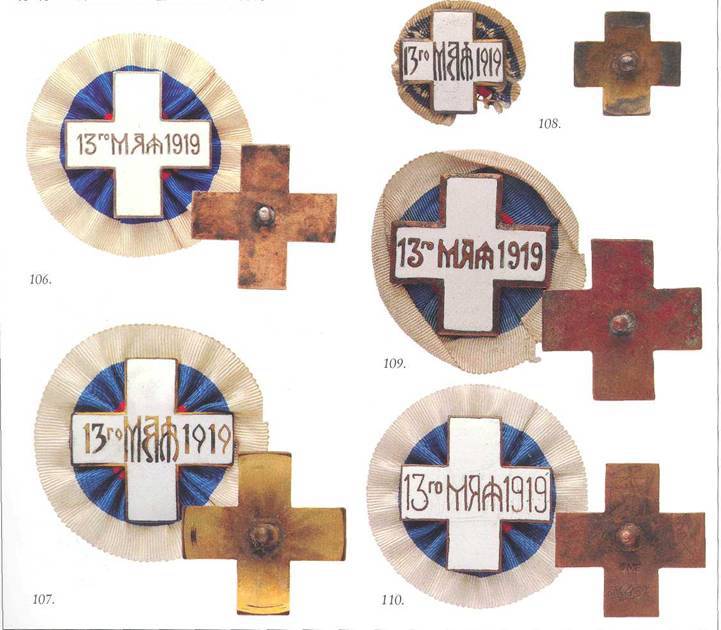
Taking command and inspecting front-line units, Yudenich briefly returned to Helsingfors in his last attempt to persuade the Finns to give him a helping hand from the Karelian Isthmus, without which the attack on Petrograd seemed almost hopeless. When that failed, at the end of June, the commander-in-chief arrived in Revel, where he was closely engaged in preparing a bold operation, which, carried out in the past, and against some Turks, could well bring him the first degree of the Order of Saint George (three white enamel the cross of the general already had).
The reason that prevented Yudenich from becoming the fifth in the series of full St. George Cavaliers in the entire history of the order’s existence was not in him, but in those who executed, or rather, did not carry out his orders. What was the notorious North-Western Army?
Its backbone consisted of the Pskov Corps (the name was changed several times) of a very small number, formed in October 1918 in the German-controlled territories of the Baltic and North-Western Russian regions occupied by the German army as a result of the offensive and the separate Brest peace. This compound was almost half made up of volunteer officers, former prisoners of war and a certain number of “red” deserters and mobilized local residents. Cavalry-General Fedor Keller, a staunch monarchist, known for his harshness in suppressing the rebellious Poles, was to lead the corps, for which they more than once attempted to kill his life. In the First World War he served as commander of the 3 of the cavalry corps.
But on the way from the south of Russia, Keller was forced to stay in Kiev, overlaid by the Petliurists, whom he tried to fight back, promising, moreover, “in two months to raise the Imperial standard over the holy Kremlin.” Keller’s monarchist and statist views quickly turned the hetman Pavel Skoropadsky’s nationalist Kiev government against him. The general was removed from the city’s recently given leadership of the city’s defense, and on December 14 1918, Kiev was taken by Petlura’s scum. Gathering three dozen officers and cadets, Keller with a swift attack knocked out the invaders, advancing along the Khreshchatyk, from Dumskaya Square, renamed by nationalists of another era to Maydan Nezalezhnosti, but then seeing the futility of further struggle, he withdrew his detachment to the Mikhailovsky Monastery, where he offered all former to remove his epaulettes and hide, while he himself, with two loyal officers, waited for the inevitable fate.
Count Keller, the knight of Russian glory, did not seek escape in flight.
He rejected all the offers, did not take off any hats or shoulder straps:
"I went to battle a hundred times and saw death," he replied.
Well, could he remove the victorious cross, that he should always be on it,
To part with the cap of the reserve, given to him by the King? ..
Murderers of a gang of savagery broke into a peaceful monastery.
He came out to meet them boldly, an epic Russian hero.
They calmed down, subdued bastards. Their burned and tormented bright eyes,
They are ashamed, and they are no longer happy to execute the sentence.
Accompanied by the villains left the graph last shelter.
With him - the noble Panteleev and the faithful captain Ivanov.
Around night reigned mute. Covered in white veil,
A horse over the precipice, heaving, stood Khmelnitsky, as if alive.
Visually to the motherland of the beloved, at the time of the rampant dark forces,
He is about the One - Indivisible in contrast to them spoke.
Before this gang of prisoners, creating an Orthodox cross,
Count Keller rose to his height gigantic, giving his life for the King.
So as not to meet him in his eyes, by chance, even in the night,
Cowardly of all having finished behind, executioners fled from the bodies.
Morning shimmered. The trail is bloody alel on snow silver ...
Thus died the knight of Russian glory with the last thought of the Tsar.
The author of this artistically unpretentious, although factually correct text, Peter Shabelsky-Bork in March 1922, arranged a shooting at the Berlin Philharmonic Society, trying to finish off a lecture by Pavel Milyukov; nine people were injured, but the leader of the cadets was not injured. But at the same time he was killed, even by another "shooter", another well-known cadet, Vladimir Nabokov, the father of the famous writer, who tried to snatch weapon from the hands of the future author of "The Knight of Glory". Coming out of a German prison under an amnesty in 1927, Shabelsky-Bork began poems with a sample of which we had just read, then became fascinated by Nazism, received a pension from the Nazis who came to power in Germany and, like other small Hitler henchmen, safely emigrated after the war in Germany Argentina.
But back to our story. Long before Yudenich led the North-Western army, in the beginning. November 1918, German aid to Russian volunteers ceased due to the revolutionary events unfolding in Germany itself and its withdrawal from the war. The Germans hurriedly left the areas occupied by them, where the Bolshevik detachments immediately rushed. The few white forces, abandoned to the mercy of fate, tried to keep Pskov behind them, but were knocked out by the red and fled to Estonia in a panic, subsequently taking part in its defense.
13 May 1919 reformed the five-thousandth Northern Corps launched an unexpected offensive near Narva, broke through the defenses of the Soviet Army 7 and quickly advanced further, bypassing Yamburg, which fell on May 17. A week later, the whites regained Pskov, went to the approaches to Luga, Ropsha, Gatchina. Impressed by the initial success of the corps, its then commander, General Alexander Rodzianko, established an 10 July order to cross the 13-th May 1919 cross - “a gilded white enamel cross with identical sides (39 mm), along both sides of which there is an inscription in Golden Slavonic script: "13 MAY 1919 ″." The award was worn on a round rosette of national colors on the left side of the chest.
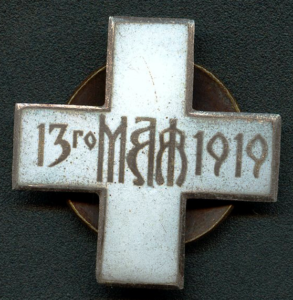
Soon, however, the forces of the White Guards were exhausted. Meanwhile, the Red Army pulled up reserves and, in the course of the ensuing counterattack, took both Pskov and Yamburg back.
Now the Western Allies considered it timely to strengthen Yudenich’s army. Back in July, they supported the Russian commander-in-chief in the intention to transfer to the Petrograd direction the Pavel Bermont-Avalov pro-German Western Volunteer Army, located in Courland. True, this brave adventurer had completely different goals in the Baltic states. Only part of his troops crossed the sea to Yudenich, while the rest, up to fifty thousand, whose absence soon affected the main front, unsuccessfully stormed Riga, so the English the fleet instead of supporting Yudenich, I had to take part in its defense on the side of the Latvians.
Bermont, a scoundrel who squandered the forces imprudently entrusted to him, nevertheless managed to establish an award - the cross of the Western Volunteer Army. Here is its description: "The Maltese cross of white metal, covered with black matte varnish or black enamel, size 51 mm, worn on the left side of the chest on the screw. This cross was called the Order and had two degrees. The military were awarded a cross with swords, and civilians without swords. ” The cross of the I degree “was worn on the neck on a black ribbon with a border: on the one hand Russian national colors (white-blue-red), and on the other - Germanic (black-white-red). When worn around the neck - the German colors are at the top, the same when wearing the second degree on the chest with a bow. " Cross II degree, smaller, worn with a bow on the chest.
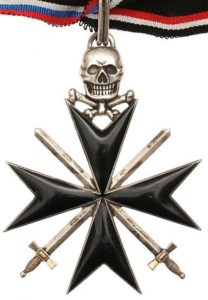
German volunteer units that were part of the Bermontov army had their own award badge, the Baltic Landwehr cross was “a black iron rectangular cross, on which a smaller, smaller gilt cross was laid, having gilded lilies at its four ends”.
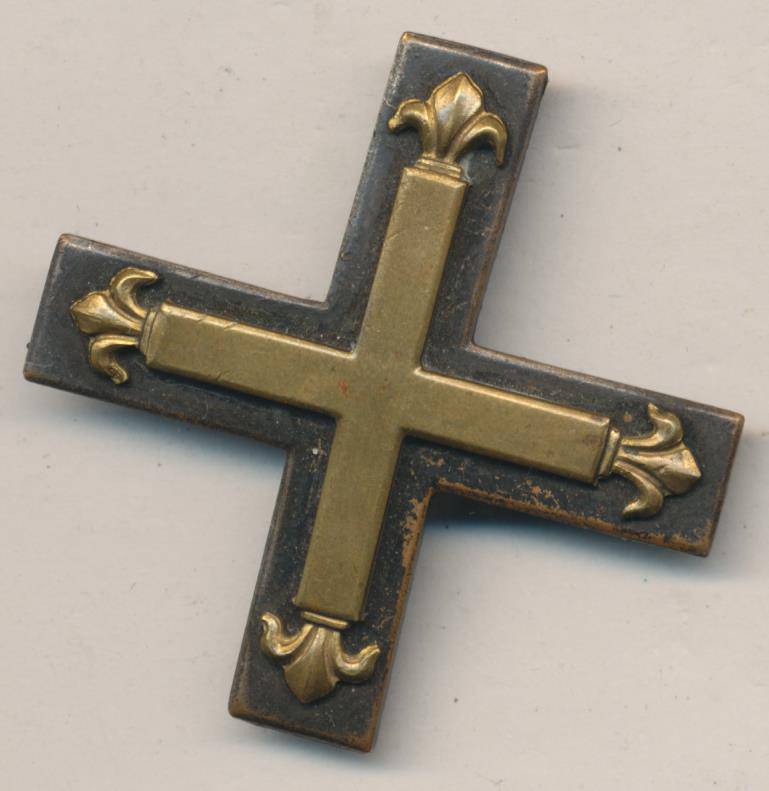
While the former enemies, Russians and Germans, were treading in front of impregnable Riga, the North-Western army, only part of which had normal equipment and full armament, which did not reach even twenty thousand, on October 10 launched a decisive offensive. At first, it developed extremely successfully, and Petrograd, which was dying of hunger, remained, as they say, within reach. The troops reigned extraordinary rise.
Although higher-ranking commanders, division commanders and “atamans”, such as the punitive Pole, the future General of the Polish Army Stanislav Bulak-Balakhovich, who terrorized the Russian population with his flying squad, during the years of post-revolutionary division in the country, they no longer considered discipline and subordination. They wanted to assign each person the honor of liberating North Palmyra from the Bolsheviks and therefore ignored the orders of the commander-in-chief on the ground, having no idea about the general situation at the front.
On the contrary, having recovered from the initial shock, the Reds restored order in their rear with great measures. Communists and Komsomol members were mobilized, thousands of women were forced to build street barricades. October 17 to the workers and the Red Army appealed with appeal Vladimir Lenin.
“Comrades! The decisive moment has come. The tsarist generals once again received supplies and military supplies from the capitalists of England, France, and America. Once again with the gangs of landowner sons they are trying to take Red Peter. The enemy attacked in the midst of negotiations with Estonia about peace, attacked our Red Army soldiers who believed in these negotiations. This traitorous nature of the attack explains, in part, the quick success of the enemy. Taken Krasnoe Selo, Gatchina, Vyritsa. Two railways to Petersburg were cut. The enemy seeks to cut the third, Nikolaevskaya, and the fourth, Vologda, in order to take Peter by hunger. ”
Five days later, in a letter to Leon Trotsky, the Bolshevik leader used a more natural rhetoric:
“To finish with Yudenich (to finish off exactly - to finish) to us is devilishly important. If the offensive is launched, is it possible to mobilize thousands more St. Petersburg workers 20 plus thousands of bourgeois 10, put their machine guns behind them, shoot a few hundred and achieve a real mass pressure on Yudenich? ”
And to achieve such pressure soon succeeded. By concentrating much more superior forces against whites, partly even abstracting from the struggle in the south with Anton Denikin, the Red Army defeated the White Guards, who for some time resisted with the courage of despair, in stubborn battles.
General Yudenich wrote in those days to the Estonian commander-in-chief:
“The red forces are stubbornly attacking and in places squeezing parts of the army entrusted to me, especially from Gdov. The troops are extremely tired of continuous battles. In the extremely narrow space between the front and the Estonian border - in the immediate rear of the troops all the transports, reserve, prisoners, refugees gathered, which to the utmost constrains the maneuvering of the troops, the slightest failure can create panic in the rear and lead to a catastrophe and the death of the whole army. It is necessary to transfer all the rears to the left bank of the Narova not later than tomorrow. I foresee the possibility and even the inevitability of a further withdrawal of the army, which may cause conflict if the border of Estonia is crossed. In order to avoid the inevitable death of the army, I ask you not to refuse immediately to take under your command the army entrusted to me and assign it a sector in common with the troops entrusted to you. I ask you to report my request to the Estonian government on accepting the North-Western army under the auspices of Estonia. For negotiations, commanding General Rodzianko. "
Last year’s story repeated: whites, demoralized by defeat, retreated everywhere and tried to hide outside Estonia. However, the political situation has changed: the Estonian government now wanted a speedy peace with the Bolsheviks, and this time the volunteers were not waiting here for rest and re-formation, but internment, hunger and typhoid, which claimed the lives of several thousand soldiers.
The same situation reigned in those days throughout the Baltics. Here is a characteristic excerpt from the Secret Report of the North-Western Front on the Situation of Russians in Estonia:
“Russians began to be killed right on the street, locked up in prisons and concentration camps, and generally oppressed in every possible way by any means. Refugees from the Petrograd province, the number of which was more than 10 000, were treated worse than cattle. They were forced for days to lie on the bitter cold on the railroad sleepers. A lot of children and women died. ”
January 22 1920, the Northwest Army officially ceased to exist.
In memory of her, there was a sign of the veteran North-Westerners Association, which in a reduced form repeated the chevron, which participants of the unsuccessful march wore on their sleeves, “a gilded triangular shield — a chevron of national colors, in the red field of which there is a white cross. On the sides of the cross are golden letters “S. Z. ", and at the top of the same gold date:" 1919 ". The size of the 2 mark on 2 cm.
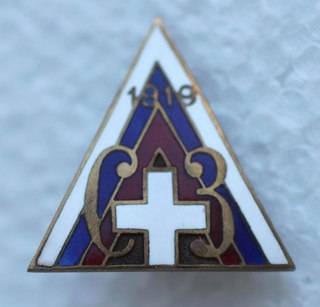
The veterans of the 5 th "Livonian" division, so named after their first commander, the Most High Prince Colonel Anatoly Leven, wanted to have their own memorial sign - "a gilded cross of white enamel, with two golden swords turned down. In the middle of the cross there is a shield, forms of stamp, national colors: white-blue-red, on it is the golden letter “L” and the memorable date “1919”. The shield is crowned with a gold crown. The size of the 2 mark on 2 cm.
“The Old Man” Bulak-Balakhovich also subsequently established for his squad a special “Cross of the Brave” - “white metal, form of St. George, covered with white enamel, size 35 on 35 mm. In the center of the cross there is a stamped round medallion of oxidized silver, on which a dead head is depicted above a crossed sword and torch. ” As you can see, the taste of the Polish "father" was absent just as fear and conscience.
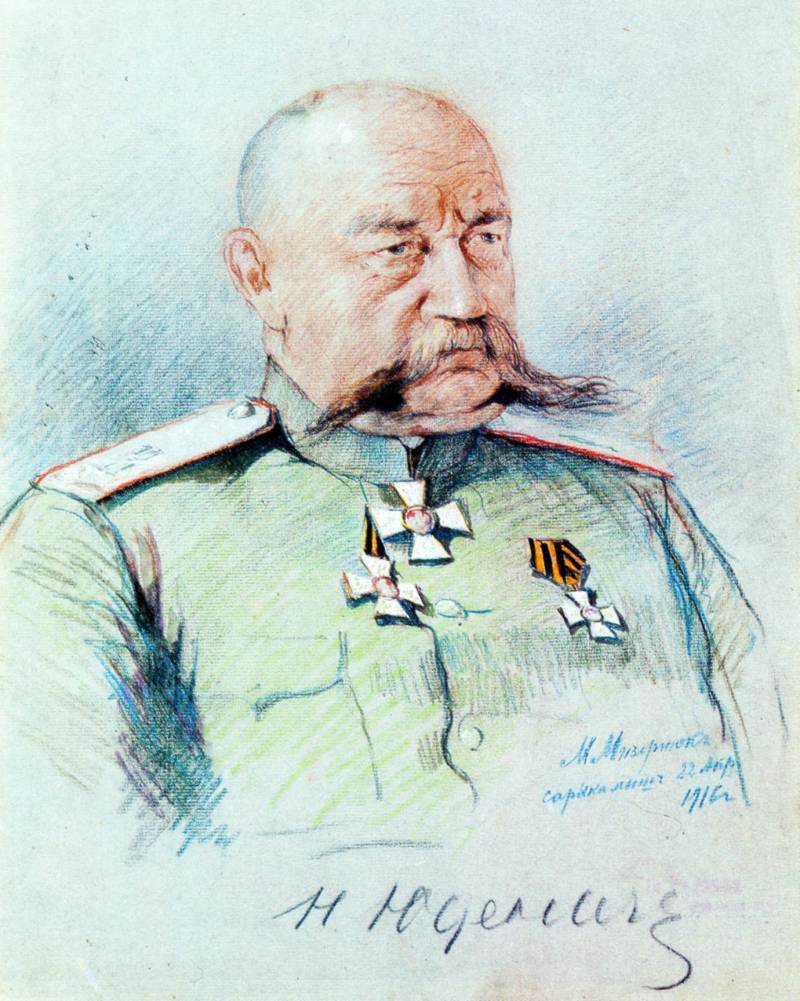
Information